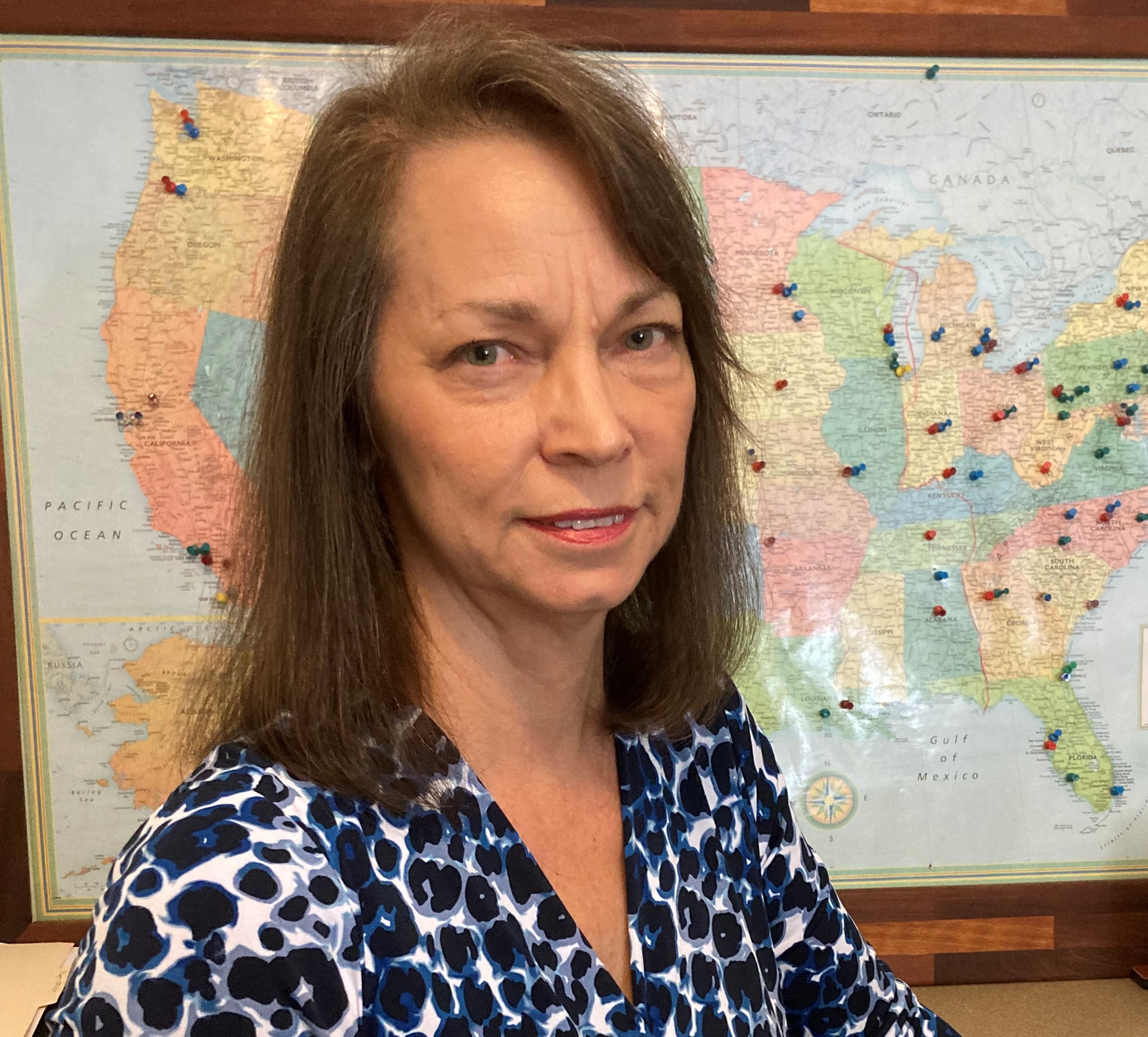
Several RTs go back to school to earn an advanced degree, and many of them have chosen the bachelor’s in business administration in the hopes that it will further their careers in respiratory care management.
 Cynthia Knoche stands in front of a map showing the location of the ALS Association chapters and multidisciplinary clinics.
Cynthia Knoche stands in front of a map showing the location of the ALS Association chapters and multidisciplinary clinics.Cynthia Knoche, BBA, RRT, is one such therapist, but for her, the BBA opened a very different door — one that is allowing her to combine her RT skills with her business skills to help manage programs for a group of patients who desperately need the services of respiratory therapists on their multidisciplinary team.
Expanding options
Knoche says she can trace her interest in health care back to high school, where she was fascinated by subjects like anatomy and physiology. She wanted to work in a hospital when she graduated, and when the RT department at her local facility had an entry-level position open, she jumped on it.
Soon she was earning her certification as an EMT and volunteer firefighter. Still, she knew she’d need at least an AS in respiratory therapy to continue to progress in the profession, so she enrolled in the program at Central Piedmont Community College and became an RRT.
It was her business degree from the University of North Florida, however, that allowed her to delve more deeply into areas that play into her current role as director of chapter care services for the Amyotrophic Lateral Sclerosis (ALS) Association.
“The business degree expanded my clinical options into the pharmaceutical field, DME, and home care environments,” she said. “This included fulfilling the multiple DME and home care needs of ALS patients.”
Wide-ranging responsibilities
She has been with the ALS Association for 15 years now, the past five as director of chapter care services. The role requires her to provide guidance and assistance to chapter leadership and the multidisciplinary clinics they support on everything from recruitment and hiring of patient services staff to promoting uniformity and consistency of programs. She also plays a key part in the development and placement of clinic relationships.
“The mission of the ALS Association is to discover treatments and a cure for ALS and to serve, advocate for, and empower people affected by ALS to live their lives to the fullest,” she said. “Working with our nationwide network of chapters and multidisciplinary clinics, the association provides navigation and resource referrals, along with care and support services for those diagnosed with ALS and their families.”
The chapters also offer educational services to general and professional communities touched by ALS alike.
Optimizing quality of life
It’s not an easy job.
“A diagnosis of amyotrophic lateral sclerosis leaves people with the inability to walk, talk, eat, or breathe,” noted Knoche. “Unfortunately, most people diagnosed with ALS succumb to respiratory failure.”
The clinics are there to help ensure those patients live the best quality of life possible for as long as they can, and she emphasizes that it is a team effort. At the nearly 100 clinics around the country, patients and families see neuromuscular neurologists, RTs, physical therapists, speech-language pathologists, medical social workers, and registered dieticians.
Despite the challenges — or maybe because of them — she advocates for the importance of RTs in this setting among her colleagues in the profession.
“Because studies indicate patients who attend ALS multidisciplinary clinics survive longer, it is imperative respiratory therapists contribute their knowledge and skills in support of airway clearance and noninvasive and invasive ventilation,” she said.
While there is no cure for ALS yet, Knoche says the multidisciplinary care provided by the clinics can and does result in greater positive outcomes for these patients. Regardless of a patient’s decision regarding including ventilatory support in their health care plan, she believes it is essential to ensure that families and health care professionals are aware of options available that support airway clearance and adequate ventilation, which are key to supporting longevity and quality of life.
When patients are admitted to hospice for end-of-life care, RTs are there as well to ease their transition, and they are also there to assist family members who remain determined to give their loved ones — like the ventilator-dependent father who still goes to watch his daughter play soccer every Saturday morning — the best life possible.
Tips for success
Knoche says combining her background in RT with the skills she learned in business school has enabled her to succeed in her nontraditional management position.
“I’ve been fortunate that blending the clinical background garnered as a respiratory therapist and the process framework acquired in business school has provided a foundation to add value in my role of supporting the education, care, and services the ALS Association brings to those living with ALS,” she said.
Along the way, she has worked with AARC Advocacy and Government Affairs on key regulatory and legislative issues impacting patients with respiratory disease as well.
Cynthia Knoche has this advice for anyone who might like to step outside the bounds of traditional respiratory care management to take on a position similar to the one she holds today at the ALS Association —
- Strive to excel in whatever role you currently provide.
- Expand your knowledge and skills within and across the broad spectrum of respiratory care and services.
- Recognize the synergy of working with interdisciplinary teams.
- Never lose sight that our efforts ultimately support quality of life as determined by the patients we serve.





